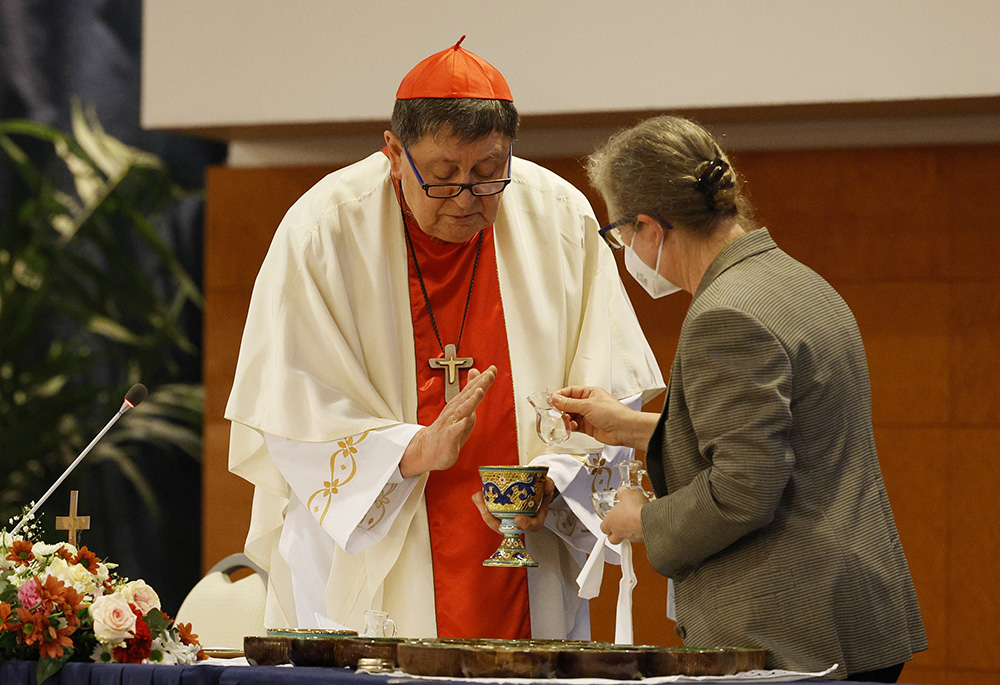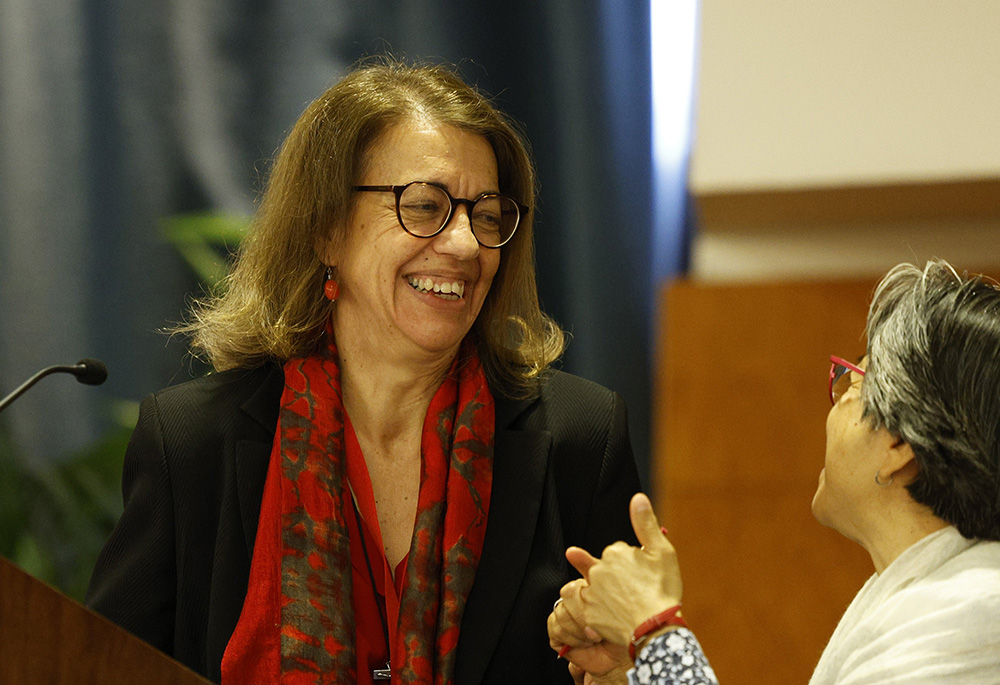
Cardinal João Braz de Aviz, prefect of the Congregation for Institutes of Consecrated Life and Societies of Apostolic Life, is assisted by Comboni Sr. Gabriella Bottani, international coordinator of Talitha Kum, during a May 3 Mass with superiors of women's religious orders at the plenary assembly of the International Union of Superior Generals in Rome. (CNS/Paul Haring)
On the second day of the triennial plenary of the International Union of Superiors General (UISG), the prefect of the Congregation for Institutes of Consecrated Life and Societies of Apostolic Life praised UISG and its members for their commitment to acting in a synodal way since UISG's founding more than a half-century ago.
"You've been walking in this direction for so many years," Brazilian Cardinal João Braz de Aviz said in a May 3 afternoon address to more than 500 sisters gathered in Rome for the UISG plenary. "UISG has been working this way for 57 years."
"You're gathered from all over the world. It makes you share dreams and hopes."
Sisters have long modeled a way to recognize and accept diversity within the church, the cardinal said, which is especially important in a time when Pope Francis is calling for a synod on synodality.
"We must discover diversity as richness," said Braz de Aviz, who earlier in the day celebrated Mass with the sisters.
"We really need to discover new pathways, new pathways together," he said. "In this common journey, the whole question of relationships becomes fundamental."
The cardinal also praised the sisters for their plenary theme, "embracing vulnerability on the synodal journey," saying a church that affirms vulnerability is a church that recognizes the realities of the world today.
Advertisement
"Vulnerability is something concrete," Braz de Aviz said. "We need to start from where we are with the problems of our time."
He noted that the global pandemic and the war in Ukraine have shown how vulnerable the world can quickly become.
"We didn't think we were close to a pandemic, but we were," he said. "We didn't think we were close to a war, but we were."
Given such vulnerabilities, the cardinal said, the church needs new leadership models that respect diversity and the need for deeper listening and understanding by all, another way in which Catholic sisters have been models, he said.
Earlier in the day, Spanish Sr. Nurya Martinez-Gayol Fernández, a theologian and member of Handmaids of the Heart of Jesus who teaches at Comillas Pontifical University in Madrid, spoke on the theme "the spirituality of synodality." She said synodality "calls for specialists in patience."
"Synodal spirituality must be a spirituality of listening because the first thing we need to do in order to take charge of the world is listen to it and listen to ourselves," she said. "We can always listen. There is always someone who needs to be listened to."

Sr. Nurya Martinez-Gayol Fernández, a Spanish member of the Handmaids of the Heart of Jesus, left, speaks with Sr. Aurora Torres Hernandez, a member of the Sisters of Marie Reparatrice, as she gives a talk to superiors of women's religious orders May 3 during the plenary assembly of the International Union of Superior Generals in Rome. (CNS/Paul Haring)
Without listening, "there is no discernment," she said.
"Each and every one must be listened to, and in order to listen to each one, it is necessary to create that inner space that allows me to welcome the other and her word and, along with it, her experience, her reality, her perception of things, and the Spirit that dwells in her and wants to come out from her to meet me."
She quoted Pope Francis, who has said that listening "corresponds to God's humble style."
"This attitude of humility," she said, "is increasingly important if we intend to live a spirituality of listening." She added: "We will not be able to embrace vulnerability on the synodal journey without introducing vulnerable listening into our way of dealing with reality."
"Only humble listening can really affect and change us. Without humility, there is no listening. Without listening, there is no synodal journey."







